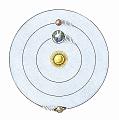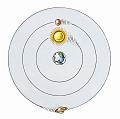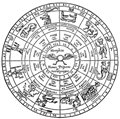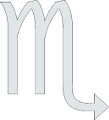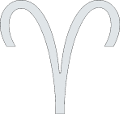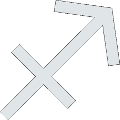Astrology
THE WORD /I ASTROLOGY" comes from the Greek astron, meaning "star,"and the suffix" -logy," meaning" study of." Since Babylonian times, people staring at the night sky were convinced that the regular motions of the heavens were indications of some great cosmic purpose. Priests and philosophers believed that if they could map the stars and the movements of the stars, they could decode these messages and understand the patterns that had an effect on past and future events. What was originally observational astronomy-observing the stars and planets-gradually grew into the astrology that has today become a regular part of many people's lives. However, there is no evidence that the stars and planets have any effect on our personalities or our destinies. Astronomers now agree that astrology is superstition. Its original noble motives should not be forgotten, however. For most of the so-called"Dark Ages," when all pure science was in deep hibernation, it was astrology and the desire to know about the future that kept the science of astronomy alive.
The Astrologer
In antiquity, the astrologers'main task was to predict the future. This woodcut, dating from 1490, shows two astrologers working with arrangements of the Sun, Moon, and planets to find the astrological effects on people's lives.
Rulership Over Organs
Until the discoveries of modern medicine, people believed that the body was governed by four different types of essences called "humors." An imbalance in these humors would lead to illness. Each of the 12 signs of the zodiac had special links with each of the humors and with parts of the human body. So, for example, for a headache due to moisture in the head (a cold), treatment would be with a drying agent-some plant ruled by the Sun or an "Earth-sign," like Virgo-when a new moon was well placed toward the sign of Aries, which ruled the head.
Perpetual Calendar
The names for the days of the week show traces of astrological belief-for example, Sunday is the Sun's day, and Monday is the Moon's day. This simple perpetual calendar, which has small planetary signs next to each day, shows the day of the week for any given date. The user can find the day by turning the inner dial to a given month or date and reading off the information.
Planetary Positions
One way in which planets are supposed to be in or out of harmony with one another depends on their relative positions in the heavens. When two planets are found within a few degrees of each other, they are said to be in conjunction. When planets are separated by exactly 1800 in the zodiacal band, they are said to Mars and Sun in be in opposition.
Being in Conjunction
The planets here are shown in a geocentric universe (pp.l0-11) where Earth is at the center. Conjunctions can be good or bad, depending on whether the planets involved are mutually friendly or not. Astrologers believe that an opposition is malefic, or"evil-willing,"because the planets are fighting against each other.
The Zodiac
Seen from Earth, the Sun, the Moon, and all the planets appear to travel along a narrow band called the ecliptic (p.13), which seems to pass through a number of constellations. Since Roman times, this series of constellations has been limited to 12 and is known as the zodiac, or "circle of animals." A person's horoscopic chart shows how the stars and planets were placed at the moment of birth. Astrologers believe that this pattern sets the boundaries for each individual's personality, career, strengths and weaknesses, illnesses,and love life.
Leo, The Lion
These 19th-century French constellation cards show each individual star marked with a hole through which light shines. Astrologically, each zodiacal sign has its own properties and its own friendships and enemies within the zodiacal circle. Each sign is also ruled by a planet, which similarly has its own properties, friendships, and enemies. So, for example, a person born while the Sun is passing through Leo is supposed to be kingly, like a lion.
Cancer, The Crab
Someone who is born while the Sun is transiting the constellation of Cancer is supposed to be a homebody, like a crab in its shell. These handpainted cards are collectively known as Urania's Mirror-Urania is the name of the muse of astronomy (p.19). By holding the cards up to the light, it is possible to learn the shapes and relative brightnesses of the stars in each constellation.
Scorpio, The Scorpion
Most of the constellations are now known by the Latinized versions of their original Greek names. This card shows Scorpius, or Scorpio. This is the sign through which the Sun is traditionally said to pass between late October and late November. Astrologers believe that people born during this time of year are intuitive, yet secretive, like a scorpion scuttling under a rock.
